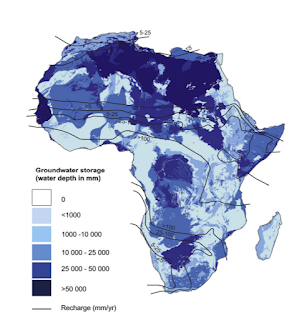Is Africa really short of water? -- The Potential of Groundwater
Groundwater is an integrated component of the natural water cycle and can be found almost anywhere beneath our feet. This hidden source of water is important for drinking, livestock, and irrigation in Africa. Sustainable freshwater sources are critical in fulfilling the sustainable development goals (SDGs), particularly SDG 6 on water. According to the first quantitative map of groundwater resources in Africa produced by MacDonald et al. (2012), the volume of groundwater is estimated to be 0.66 million km3. To view this number in a more realistic manner, this is 100 times more than annual renewable freshwater resources and 20 times more than the freshwater present in African lakes. However, this gigantic pool of ‘hope’ to Africa has been widely ignored and misunderstood. Falkenmark’s study (1989) on the Water Stress Index only sees a definite measure of water scarcity that is based on the “hydraulic density of population”. This water metric disregards freshwater storage such as groundwater and misrepresents freshwater availability and demand in sub-Saharan Africa (Taylor,2009).
Distribution of Groundwater across Africa
South Africa’s groundwater resources supply approximately 15% of the total volume of water consumed nationally (Knüppe, 2011), more than 280 cities and towns are dependent on groundwater (Van Tonder, 1999). Recorded by the most recent data, a total of 235,000 m. m3/a is available underground and between 10,000m and 16,000 m. m3/a are ready for direct use in an average precipitation year (Knüppe, 2011). It is worth noticing that South Africa’s unique aquifer system characterized by a wide range of geological structures and climatic circumstances alters hydrogeological settings and local extraction rates of groundwater (Braune and Xu, 2008). However, despite groundwater’s great potential, it is unequally distributed. Over half of the water supply ends up in only 4 countries, namely Nigeria, Congo, Cameroon, and the Democratic Republic of Congo.
Potential of Groundwater
The greatest potential of groundwater lies within the economic advantages of groundwater extraction. Found by Dittion and Kamwamba (2013), the value-added per area in irrigation zones supplied by groundwater is twice more than irrigation zones supplied by other irrigation methods. Furthermore, groundwater supplies various small-scale irrigation projects where these projects can have a greater return of capital investment in comparison to large-scale dam constructions. For Africa's local farmers, the adoption of groundwater irrigation allows them to plant a more diverse range of crop products. Farmers possess a greater sense of control in their hands than rain-fed agriculture which is highly dependent on seasonality and rainfall level.
Groundwater pollution
Overviewing the whole population of Africa, over 65% of the people rely upon the basic pit latrine sanitation and 10% have no sanitation systems, while 25% of the population is reported using a ‘flush toilet’ (Adelana and McDonald, 2008). The coverage of septic tanks is concentrated in larger cities where water-borne sewage systems exist, and even at these places, the dwellings in coverage are not connected to each other. What this reveal is the potential of large subsurface contaminant and the threat of groundwater pollution. The major sources of groundwater pollution come from high nitrate concentrations, sourced from industrial effluent disposal, and leachates from solid-waste tipping. Another source of groundwater pollution is fecal contamination. This remains a serious problem in Africa because of inappropriate sanitation unit designs and utilization of such facilities, there is no solid perimeter around each water supply well (Gaye and Tindimugaya, 2018).
Groundwater management challenges
Because
of urbanization, substantial groundwater development for domestic water supply
occurred throughout Africa in the twentieth century. Groundwater is widely
scattered and generally of potable quality, it is widely used as a low-cost
alternative to surface water in metropolitan water systems. However, the
increased reliance on groundwater for urban water supplies and agriculture
raises questions about the sustainability of groundwater resources and the
scale of extraction. Sub-Saharan Africa is one of the world's most urbanizing
regions (UN, 2007),

This is well written with a good engagement with literature and clear presentation. I'll suggest that a specific case study country will be more helpful in explaining the issue of water and food but this is not to say that your approach is wrong, hopefully there will be specific case studies in subsequent posts.
回复删除I really enjoyed your piece and found the use and engagement of literature useful as I am currently writing my blog on groundwater. Do you think there is more than just informational and technical constraints to groundwater management but also political constraints and who manages groundwater extraction?
回复删除Hi, thank you for your comment. You are absolutely right that there are political constraints to groundwater management and extraction, but I chose to devote this blog to focus more on a community based perspective, recognizing the practical difficulties for local farmers in their access to groundwater which I found this a more interesting idea to explore.
删除I, again, really enjoyed this post; the Map at the start is great! Perhaps you could summarise with a sentence at the start and end just to explain the overall point/goal of this post?
回复删除